A data integration specialist connects and manages data across different systems to ensure seamless data flow. You design, implement, and maintain solutions that help organizations share information efficiently.
Today, the role of a data integration specialist is crucial as organizations manage massive data volumes from many sources. Poor data quality and fragmented systems can cost companies millions each year and slow decision-making. FineDataLink offers solutions that address these challenges by supporting real-time data integration, handling various data formats, and improving data quality for better business intelligence.
| Statistic | Description |
|---|---|
| 64% of organizations | Cite data quality as their top data integrity challenge. |
| $7.8 million | Annual cost of data silos in lost productivity. |

A data integration specialist plays a vital role in modern organizations. You manage the flow of data between systems, ensuring that information is accurate, timely, and accessible. Your responsibilities cover the entire lifecycle of data integration projects, from planning and design to implementation, testing, and ongoing maintenance. You help organizations unlock the value of their data by building robust data integration solutions that support business intelligence, analytics, and operational efficiency.
As a data integration specialist, you design integration solutions that connect diverse software and data sources. You start by understanding business requirements and translating them into technical specifications. You plan how data will move between systems, considering factors like scalability, flexibility, and security. You often use modular design, breaking down the integration pipeline into components such as ingestion, transformation, and storage. This approach helps you scale solutions as data volumes grow.
You select the right data integration tools and platforms for each project. FineDataLink, for example, offers a low-code environment that simplifies the development of custom integrations. Its drag-and-drop interface and support for over 100 data sources make it easier to build and maintain data pipelines. You can synchronize data in real time, automate ETL processes, and create APIs for seamless data exchange between applications.
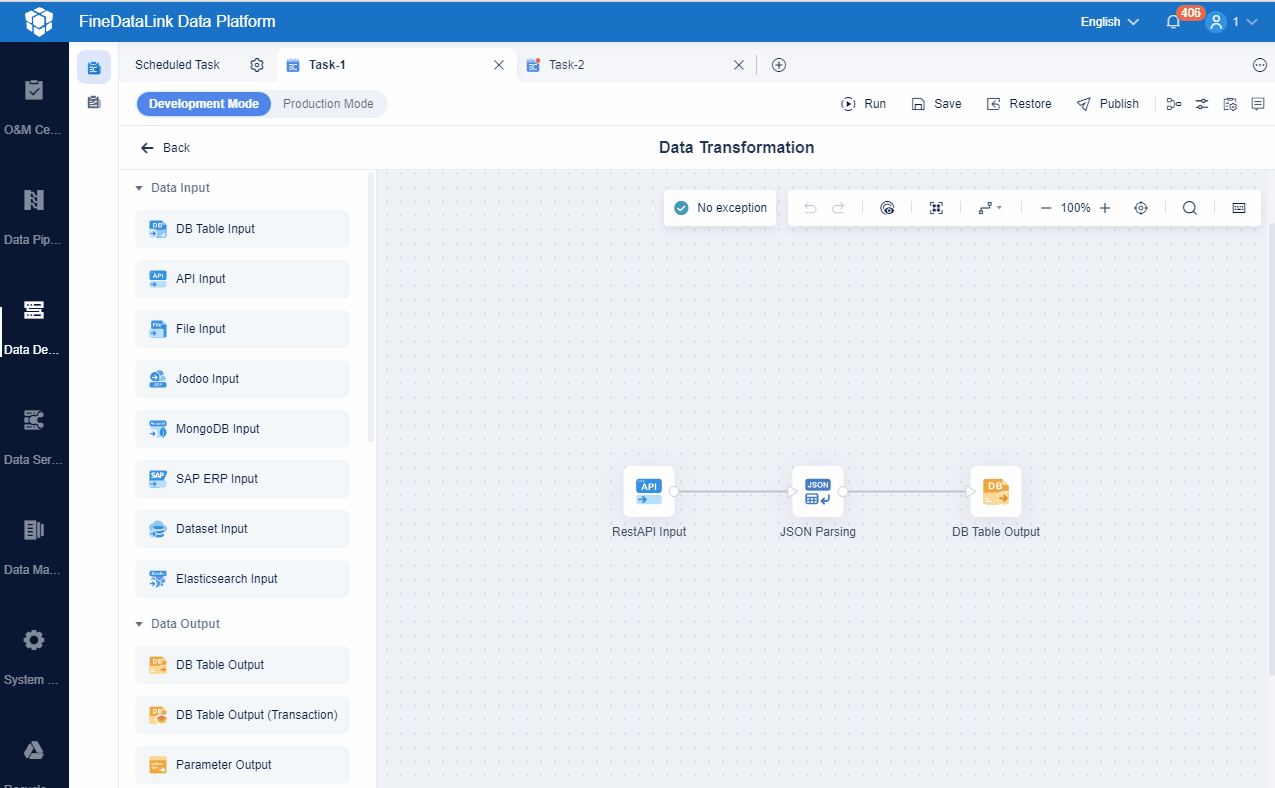
Best practices for designing integration solutions include:
| Best Practice | Description |
|---|---|
| Modular design | Decompose the pipeline into discrete components (ingestion, transformation, storage) for scalability. |
| Resilience | Implement error handling and retries to manage data anomalies and transient failures. |
| Scalability | Use distributed processing frameworks for handling large data volumes. |
| Data Quality and Governance | Integrate validation rules and metadata management to ensure high data quality. |
| Security and Compliance | Use encryption and access controls to protect sensitive data and ensure compliance with regulations. |
| Automation, Monitoring, and Logging | Utilize CI/CD pipelines and monitoring tools to streamline processes and track performance. |
| Infrastructure as Code (IaC) | Manage infrastructure through code for consistent and reproducible environments. |
| Data Orchestration Tools | Use tools to manage and schedule data pipelines effectively. |
| Design for Idempotency and Fault Tolerance | Ensure that operations can be repeated without adverse effects, enhancing reliability. |
You also focus on aligning integration solutions with organizational strategies. Effective integration design can improve management’s perception of system value and drive efficiency. You participate in data architecture discussions and recommend new technologies to keep integration projects current and effective.
Maintaining high data quality and consistency is one of your core responsibilities as a data integration specialist. You conduct data quality assessments and implement measures to ensure that data is accurate, complete, and reliable. Data quality issues can arise at any stage of the integration process, including ingestion, storage, transformation, or consumption. These issues can affect data accuracy, completeness, timeliness, or consistency, which are critical for making informed business decisions.
You use metrics such as accuracy, completeness, consistency, timeliness, and validity to monitor data quality. For example:
| Metric Type | Importance |
|---|---|
| Accuracy Metrics | Ensures data is correct and reliable for decision-making. |
| Completeness Metrics | Measures if all required data is present, preventing gaps in information. |
| Consistency Metrics | Ensures data is consistent across different systems, reducing discrepancies. |
| Timeliness Metrics | Assesses if data is up-to-date, which is crucial for timely decisions. |
| Validity Metrics | Checks if data meets the required format and standards, ensuring usability. |
You address data consistency by implementing synchronization mechanisms, such as data replication and automated validation rules. These steps help ensure that all instances of data reflect the same information across multiple databases or systems. FineDataLink supports these efforts with features like real-time data pipelines, automatic synchronization, and high reliability. You can monitor, optimize, and maintain ETL processes to ensure efficient data flow and minimize errors.
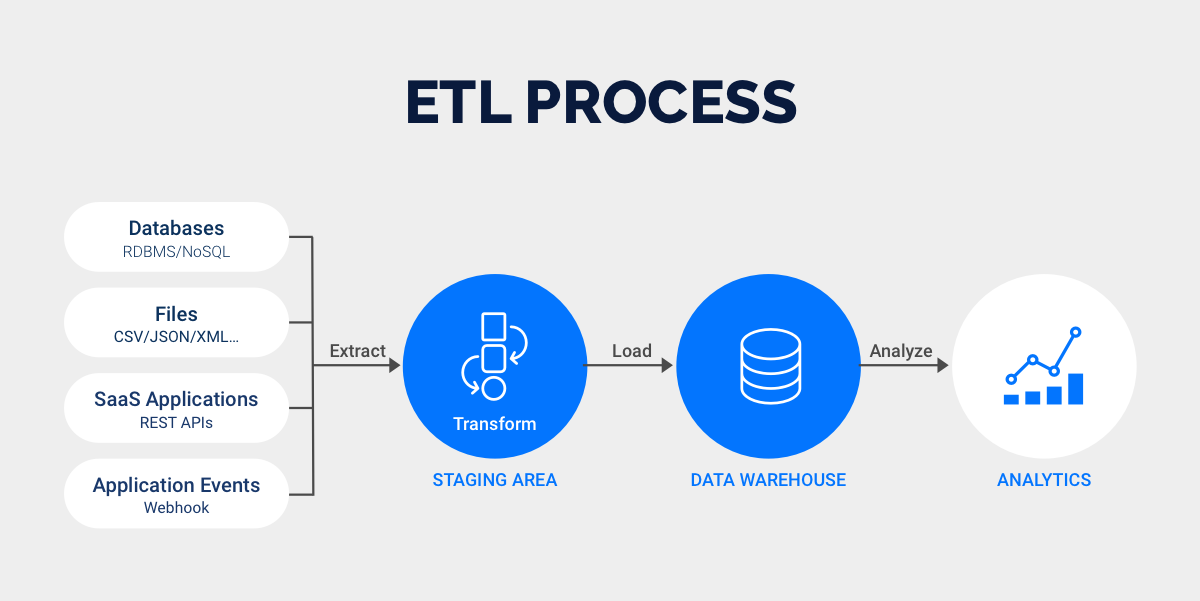
High data quality leads to better business outcomes. For instance, a retail chain improved its marketing ROI by 34% and increased annual revenue by $4.7 million after addressing data quality issues. A global manufacturer achieved 99.7% inventory accuracy and saved $8.2 million annually through a data quality initiative. By focusing on data quality and consistency, you help organizations reduce waste, improve customer satisfaction, and make better decisions.
Collaboration is essential for successful data integration projects. As a data integration specialist, you work closely with IT teams, business analysts, data governance groups, and other stakeholders. You gather business requirements, translate them into technical specifications, and ensure that integration solutions meet organizational needs.
| Collaboration Aspect | Description |
|---|---|
| Automated Workflows | Design and implement automated data workflows with IT and stakeholders to enhance efficiency. |
| Requirement Understanding | Work closely with business analysts and data governance teams to develop effective integration solutions. |
You participate in cross-functional meetings, coordinate data exchange initiatives, and provide technical support and training on data integration systems. You document integration processes, workflows, and system configurations to ensure transparency and knowledge sharing. You also manage and support data integration tools, troubleshoot issues, and implement process improvements.
FineDataLink enhances collaboration by providing a visual, user-friendly interface that allows multiple teams to participate in the development and maintenance of data integration solutions. Its real-time monitoring and flexible scheduling features help teams stay aligned and respond quickly to changing business needs.
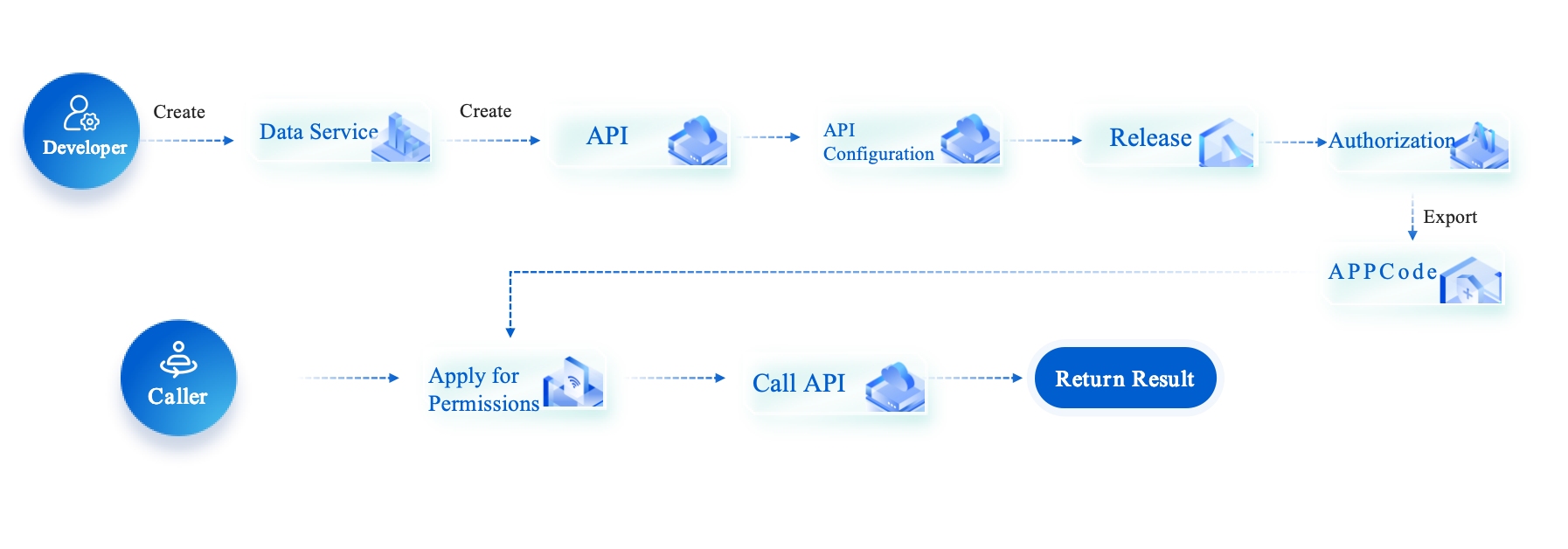
Your responsibilities also include ensuring compliance with data governance policies and security standards. You implement strict access controls and data governance measures to protect sensitive data and maintain regulatory compliance. By fostering collaboration and communication, you help organizations achieve successful data integration outcomes and maximize the value of their data assets.
Tip: Regular communication and documentation are key to successful data integration projects. Involve stakeholders early and often to ensure alignment and avoid misunderstandings.
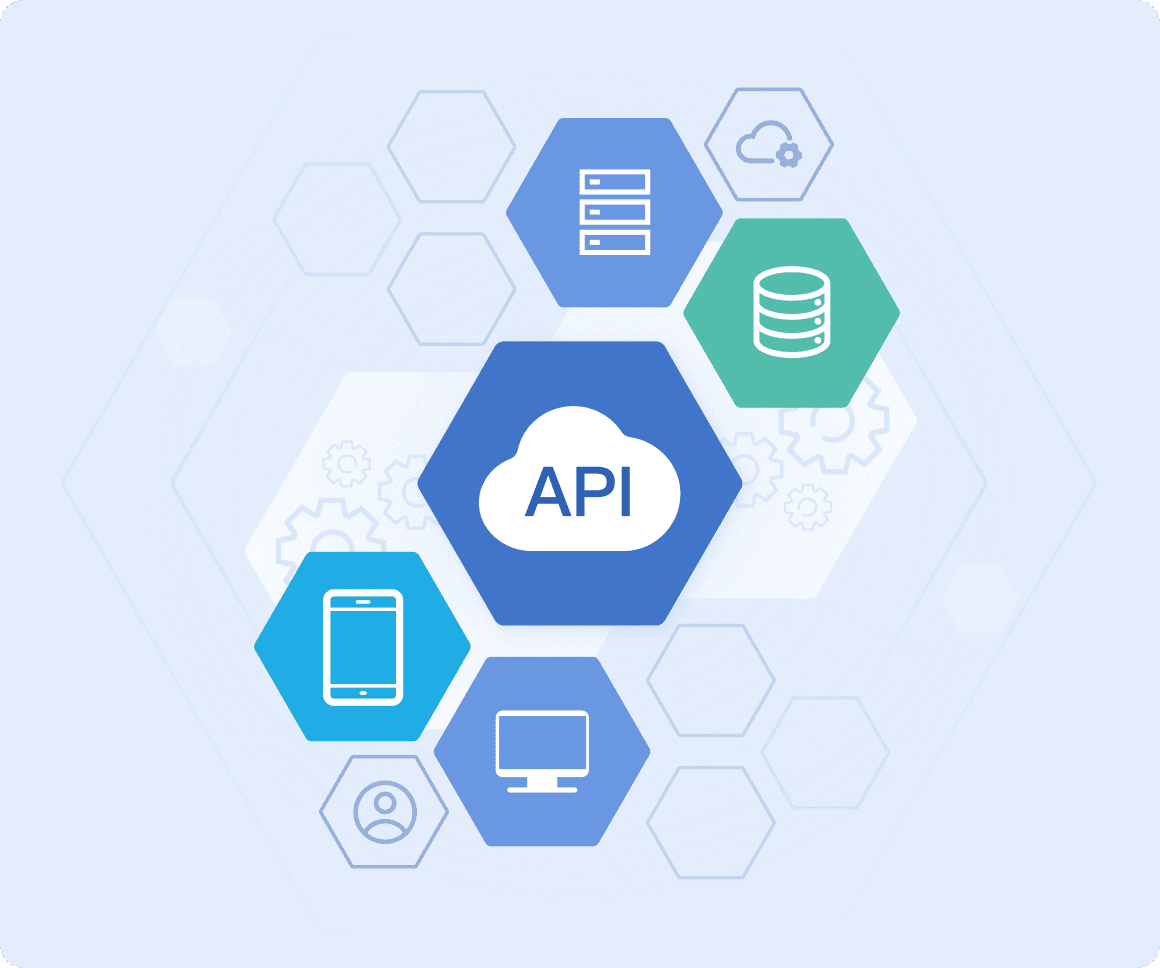

You need real-time data integration to keep your business intelligence systems current and responsive. When you access up-to-date data, you can make quick decisions that impact your business outcomes. Real-time data integration allows you to validate and cleanse data instantly, which improves accuracy and consistency. This process leads to faster decision-making, better data quality, and higher profitability. For example, immediate access to current data helps you adjust pricing or optimize inventory without delay.
A 2024 study by the MIT Center for Information Systems Research found that top-performing real-time businesses achieved 97% higher profit margins and 62% greater revenue growth than their peers.
When you implement real-time data integration, you enable your organization to optimize operations and tailor offerings more effectively. Data-driven strategies give you a competitive edge and help you respond to market changes quickly.
Data integration breaks down barriers between departments and systems. You often face challenges like resource limitations, resistance to change, scalability issues, and compliance requirements when trying to unify data. The table below highlights common barriers:
| Barrier Type | Description |
|---|---|
| Resource Limitations | Investments in new technologies, tools, and personnel are often required. |
| Resistance to Change | Employees may resist new workflows, needing clear communication and training. |
| Scalability Issues | Centralized storage becomes challenging as data volumes grow. |
| Compliance Challenges | Legal and regulatory requirements must be met for data sharing. |
When you overcome these barriers, you create a culture of collaboration and transparency. Breaking down silos ensures constant teamwork, improves operational efficiency, and drives innovation. Companies like Google and Microsoft have shown that removing silos leads to faster innovation cycles and better data accessibility.
Integrated data supports advanced analytics and improves your decision-making process. You gain comprehensive visibility and actionable insights across business functions. Real-time data and advanced analytics help you forecast trends, manage risk, and optimize resources. For example, you can use analytics for financial forecasting, budgeting, and investment management.
You also benefit from improved ROI, faster time-to-value, and enhanced data quality. The table below summarizes measurable outcomes:
| Measurable Outcome | Description |
|---|---|
| Improved ROI | Strong three-year ROI figures are common with effective data integration. |
| Faster Time-to-Value | High-impact use cases deliver value in weeks. |
| Enhanced Data Quality | Quality management prevents revenue losses. |
| Better Decision-Making | Data-driven strategies help anticipate market demands. |
FineDataLink provides a modern platform that helps you consolidate data from multiple sources for business intelligence. You can use its real-time synchronization, ETL, and API features to build a unified data layer. This approach supports analytics, reporting, and smarter decision-making across your organization.
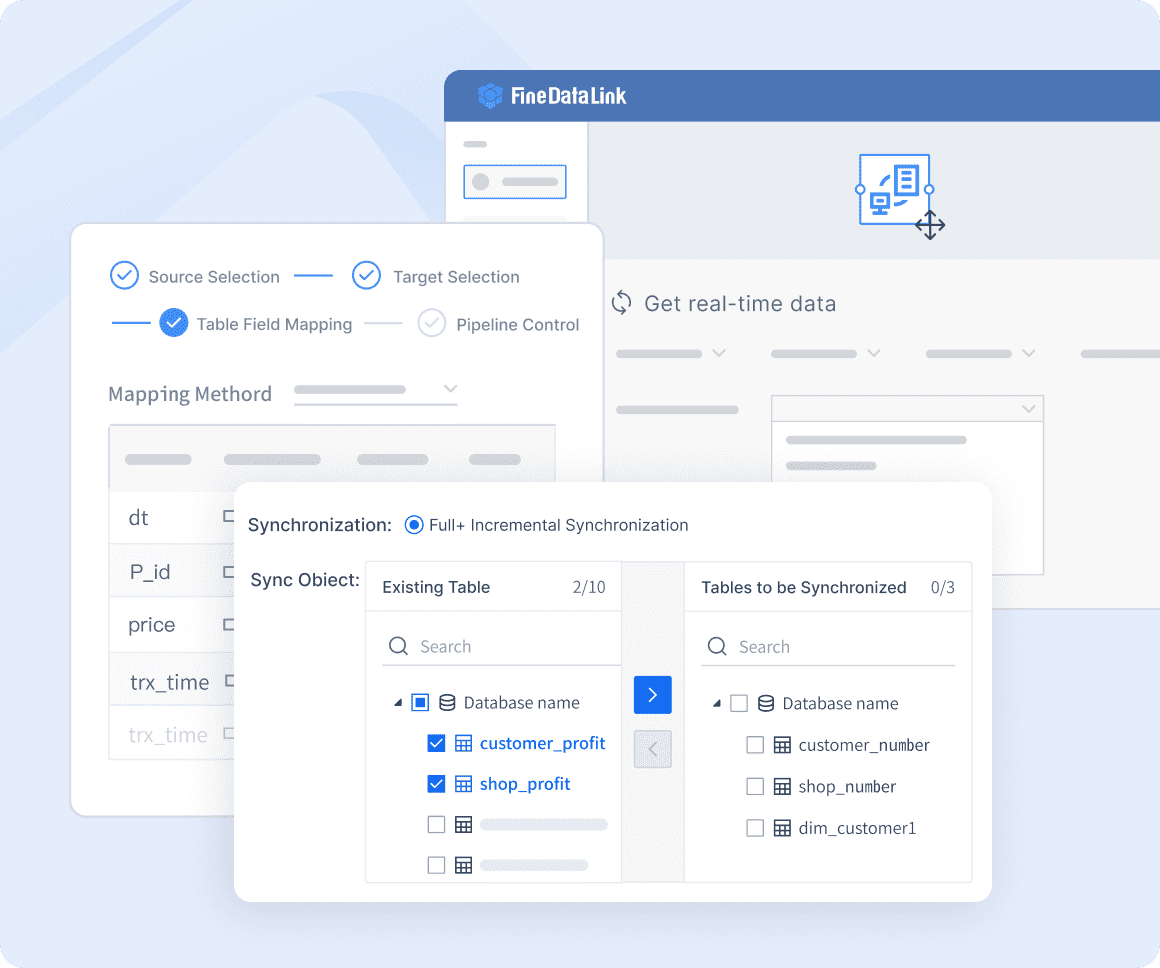
To succeed as a data integration specialist, you need a strong mix of technical, analytical, and communication skills. These abilities help you design effective integration solutions, solve complex data challenges, and work well with others across your organization.
You must master a range of technical skills to handle modern data integration tasks. Proficiency in SQL and NoSQL databases is essential. You should also know how to use containerization tools like Docker and Kubernetes, which help you deploy and manage integration solutions efficiently. Programming skills in Python and Java are highly valued, as they allow you to automate data processes and customize integration workflows.
Many organizations use specialized tools for data integration. The table below highlights some of the most in-demand platforms in 2024:
| Tool Name | Description |
|---|---|
| MuleSoft Anypoint | A comprehensive integration platform for connecting applications, data, and devices. |
| Informatica PowerCenter | A widely used data integration tool that provides ETL capabilities for data warehousing. |
| Talend | An open-source data integration tool that offers a range of data management solutions. |
Certifications can also boost your credibility. Programs like DCAM Certification, CDMC Certification, and Certified Information Management Professional (CIMP) show your expertise in data management and integration.
You need strong analytical skills to identify and resolve data integration challenges. Understanding data quality is crucial, as poor data quality leads to inaccurate analytics and decisions. You must spot the root causes of data silos and plan ways to break them down. Managing different data types and using automated integration tools helps you process large volumes of data in real time.
Tip: Always check for data consistency and accuracy before moving forward with integration projects.
Effective communication and teamwork are vital for any data integration specialist. You must coordinate with IT, business analysts, and data governance teams to ensure your solutions meet everyone’s needs. Establishing clear processes and protocols helps teams collaborate smoothly. Many organizations use project management software to track progress and keep everyone aligned during integration projects.
When you combine technical expertise, analytical thinking, and strong teamwork, you can deliver successful data integration solutions that drive better business outcomes.
When you search for a top data integration specialist, you need to focus on a mix of technical and soft skills. You want someone who can manage complex data integration projects and deliver reliable results. The table below highlights the most important qualities and experience you should look for:
| Key Qualities and Skills | Description |
|---|---|
| Technical Skills | Proficiency in SQL, expertise in data integration tools, understanding of data modeling, and experience with ETL processes. |
| Soft Skills | Strong analytical abilities, excellent communication, attention to detail, and problem-solving skills. |
| Experience | Proven experience in data integration, familiarity with cloud-based solutions, and knowledge of data governance frameworks. |
You should seek candidates who have hands-on experience with integration platforms and can adapt to new technologies quickly. You want someone who understands both the technical and business sides of data integration projects. This combination helps you achieve better project outcomes and ensures your data integration efforts support your organization’s goals.
You need to evaluate the success of integration projects using clear metrics. You should measure data quality, timeliness, system availability, and business impact. The table below shows common KPIs for assessing project outcomes:
| KPI Category | Metrics |
|---|---|
| Data Quality | Percentage of Error-Free Data, Resolution Time, Completeness, Transformation Accuracy |
| Timeliness and Budget | Migration Timeline Adherence, Budget Compliance, Process Efficiency, Resource Optimization |
| Availability | Recovery Time, System Uptime, User Satisfaction, Integration Quality |
| Business Impact | Process Improvements, Data Utilization, Return on Investment, Objective Achievement |
You can also track how often users interact with analytic tools, the percentage of data analyzed, and the number of data sources integrated. Successful integration projects often lead to improved order fulfillment, reduced errors, and better fraud detection. For example, an e-commerce company improved order fulfillment times by 35% and achieved 99.9% inventory accuracy through centralized data integration. Healthcare providers and financial institutions have also seen major improvements in efficiency and accuracy after completing integration projects.
Employers value candidates who have experience with FineDataLink. You should look for specialists who can integrate data from various sources and maintain consistency in reports and dashboards. Mastery of FineDataLink, especially with FCP certification, sets you apart in the job market. You can use FineDataLink for real-time synchronization, rapid deployment, and connecting over 100 different data sources. Its low-code design and drag-and-drop interface make it ideal for managing complex integration projects. You can quickly set up API interfaces and streamline ETL tasks, which helps your team deliver results faster. FineDataLink supports data engineers, BI teams, and application developers, making it a versatile choice for enterprise data integration.
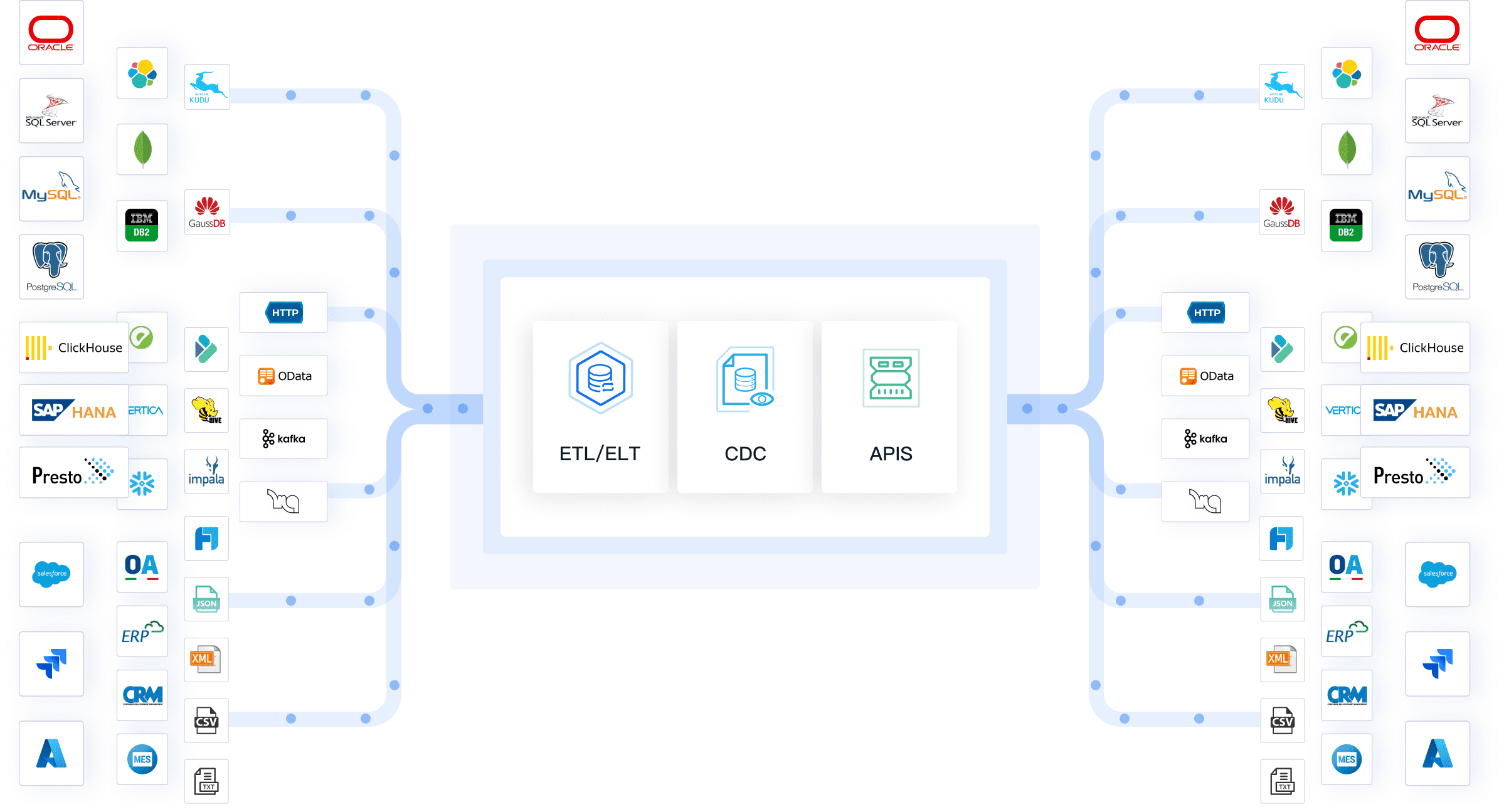
You play a vital role in shaping your organization’s digital future as a data integration specialist. Your expertise in data integration ensures accurate, timely, and secure data for business intelligence. When you select candidates, focus on both technical and collaborative skills. Platforms like FineDataLink offer real-time data integration, a user-friendly interface, and cost-effective pricing.
| Factor | Description |
|---|---|
| Set Clear Goals | Define objectives for data integration to align stakeholders. |
| Select the Right Tools | Choose tools like FineDataLink for efficient data integration. |
| Build a Robust Testing Process | Test integrated data to avoid errors. |
| Address Data Quality Issues | Ensure data accuracy and completeness. |
| Ensure Data Security and Privacy | Protect sensitive data during integration. |
| Collaborate Across Teams | Foster teamwork for successful data integration. |
| Choose the Right Technology Partner | Work with experts in data integration. |
To improve your data integration capabilities:
You can drive better decisions and greater agility by investing in data integration expertise.
Essential Data Integration: A Beginner's Guide
Top Data Integration Tools: 2025 Guide
Top 10 Data Integration Software for 2025
What is API Data Integration? API vs Data Integration

The Author
Howard
Data Management Engineer & Data Research Expert at FanRuan
Related Articles

10 Best Data Orchestration Tools for 2025 You Should Know
Compare the best data orchestration tools for 2025 to streamline workflows, boost automation, and improve data integration for your business.
Howard
Nov 28, 2025

10 Best Enterprise ETL Tools for Data Integration
Compare the 10 best enterprise ETL tools for data integration in 2025 to streamline workflows, boost analytics, and support scalable business growth.
Howard
Oct 02, 2025

What is Real Time Data Integration and Why It Matters
Real time data integration connects systems for instant, accurate data access, enabling faster decisions, improved efficiency, and better customer experiences.
Howard
Sep 24, 2025